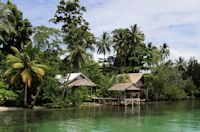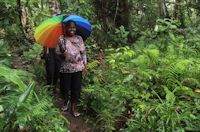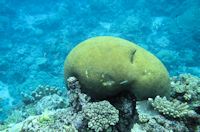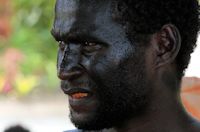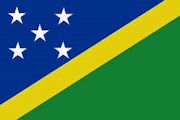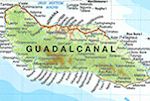Capital
of the Solomon Islands
Pictures
of Honiara
Vilu
War Museum
World
War II sites
By
Richard Moore
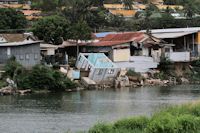 Honiara
is the main city on Guadalcanal and people’s opinions
of the city are not high.
Honiara
is the main city on Guadalcanal and people’s opinions
of the city are not high.
Initially,
it is fair to say we could see why few suggest having
a lengthy stay in the country’s capital.
It
hasn’t recovered from the ravaging of catastrophic floods
and litter covers the streets, but the people are polite
and quick to return a smile.
And
it does have some nice restaurants, although peak-hour
traffic and wandering pedestrians make for some heart-in-the-mouth
moments.
Honiara
is a good base from which to explore the island of Guadalcanal.
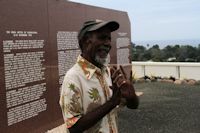 For
World War II buffs there are plenty of things to see
on day trips around the island.
For
World War II buffs there are plenty of things to see
on day trips around the island.
We
began with a visit to the US Skyline Memorial in Honiara
with a knowledgeable battlefield guide, Michael Ramosaea.
The memorial sits overlooking the city and the views
are worth checking out.
The
Stars and Stripes and Solomons flags fly over the carved
marble memorial walls, which
tell of the bloody battles fought to clear the islands
of the invading Japanese and the high cost in lives
that were claimed on the land, in the air and on the
sea.
On
the Honiara waterfront there is a statue to the courageous
Allied Coastwatchers who, together with local islanders,
monitored Japanese shipping movements.
Outside
the police headquarters is one honouring Sir
Jacob Vouza - a retired police officer whose
bravery saved an American force from a surprise Japanese
night attack.
About
50km west of the capital is the Vilu
War Museum.
The
museum building is basic but when you go through to
the outside displays you see what the place is all about.
There are the remnants of planes, engines and intact
Japanese artillery pieces.
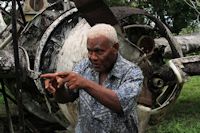 The
Vilu museum is inspiring and visitors making the effort
to see it will not be disappointed.
The
Vilu museum is inspiring and visitors making the effort
to see it will not be disappointed.
Our
last night in Honiara was spent at a very nice Chinese
establishment called the Mandarin Restaurant where the
food was superb.
Normally
I'm not a massive fan of Chinese cuisine but the food
in the Mandarin would almost have me flying back to
Honiara for a night out it was that good.
Anyway,
on our last morning we headed out early to visit a few
more key WWII sites.
The first stop was Hell’s Point, a sealed off area littered
with unexploded ordnance from the war. But, they had
some Japanese tanks and so we snuck in to get some pictures
– only to be yelled at by a rightly grumpy policeman
who asked if we had not seen the massive sign saying
“No Entry.”
Still,
we got the shots …
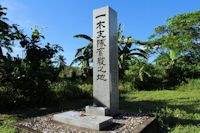 Then
it was on to Alligator Creek, the site of the battle
of Tenaru where US Marines held off a huge Japanese
attack after being warned of the assault by war hero
Sir Jacob
Vouza.
Then
it was on to Alligator Creek, the site of the battle
of Tenaru where US Marines held off a huge Japanese
attack after being warned of the assault by war hero
Sir Jacob
Vouza.
It
was a bloody affair with more than 800 Japanese being
killed. The battle features in the first episode of
the TV miniseries The Pacific.
We
drove off road a ways and came to the Ichiki
Memorial, a shrine to the Japanese troops
who died in that battle.
Next
stop was Red Beach where the Allied forces first landed
on Guadalcanal. There’s not much to see other than the
occasional wire cord sticking out of the sand.
The
same can’t be said of Tetere
War Museum where scores of Amtracks –
amphibious landing vehicles are standing about.
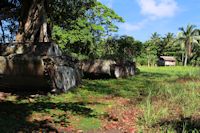 The
museum is owned by Samwell Basoe who is the grandson
of Sir Jacob Vouza.
The
museum is owned by Samwell Basoe who is the grandson
of Sir Jacob Vouza.
We
would need more than a couple of days in Honiara to
check out all of the sights on offer around Guadalcanal
and after you get your mind around the city's semi-organised
chaos it's not such a bad place to stay.
